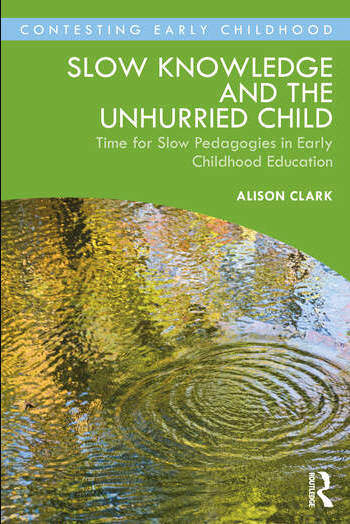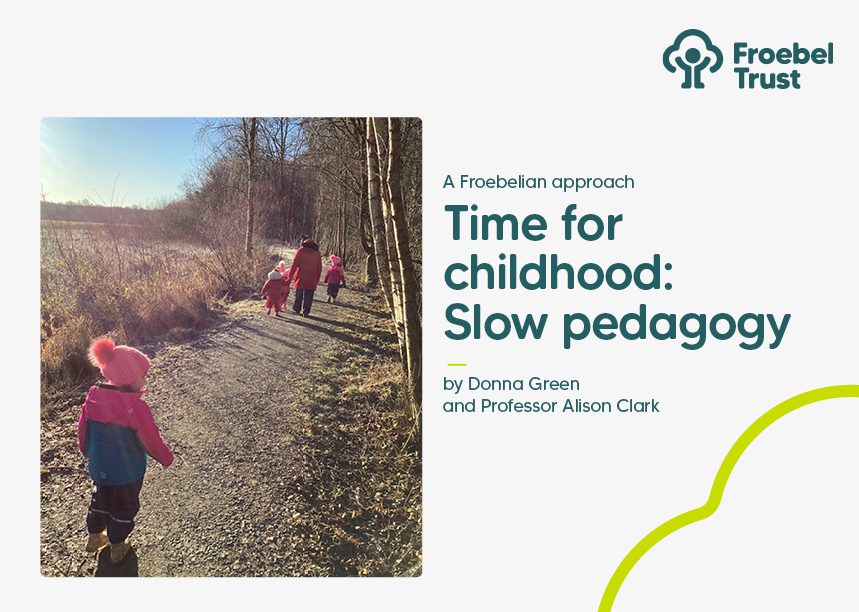A research project exploring the reasons to be slow in early childhood and gathering practical examples of what slow can look like in Early Childhood Education and Care.
The project aims to serve as a catalyst for urgent discussion among researchers, practitioners and policy makers about the relationship with time in early childhood environments, and how high quality practice in ECEC teacher education can emphasise these values.
Project summary
This project explores alternatives to the acceleration of childhood by investigating research and practice in early childhood that supports slow pedagogies and slow knowledge. It is centred on the idea that childhood needs to be valued in its own right in keeping with Froebelian principles.
The project is set against the background of increasing pressures within education and early childhood education and care that has led to an increasingly ‘hurried child’ (Elkind, 2007/1981) and hurried educators and parents. Policy demands to measure and test young children earlier have been part of this pressure (Brogaard Clausen et al, 2015). This project seeks to investigate the case for a different approach to this acceleration of childhood based on a focus on the time, pace and rhythm of early childhood practice that celebrates play.
Part One explores the reasons to be slow in early childhood by examining different understandings of time that have particular relevance for young children’s lives including ‘clock time’, ‘wasted time’, ‘playtime’, ‘embodied time’ and ‘timefullness’.
Part two explores practical examples of what slow can look like in Early Childhood Education and Care (ECEC).
- In what contexts are slow practices happening now and in the past that can enable each child’s capacity and potential to be recognised?
- What qualities and environments can support these ways of teaching, learning and living together?
Part three focuses on examples of teaching slow with ECEC students and in professional development. This will draw on the knowledge of experienced ECEC teacher educators working in diverse international and cultural contexts and using different theoretical frames for slow pedagogies.
The project aims to serve as a catalyst for urgent discussion among
researchers, practitioners and policy makers about the relationship with
time in early childhood environments, and how high quality practice in
ECEC teacher education can emphasise these values.
Meet the author
Watch a recording of a special online event to celebrate the publication of Professor Alison Clark's book 'Slow Knowledge and the Unhurried Child' (recorded Feb 2023)
Watch nowPublications
Clark, A. (2023) Slow knowledge and the unhurried child: time for slow pedagogies in early childhood education. Abingdon: Routledge.
Professor Clark's book was named 'Professional Book of the Year' at the Nursery World Awards 2023.

Kari Carlsen & Alison Clark (2022) Potentialities of pedagogical documentation as an intertwined research process with children and teachers in slow pedagogies, European Early Childhood Education Research Journal, 30:2, 200-212
Nursery World Magazine published a series of articles on Prof. Alison Clark's research:
- Alison Clark's Slow Pedagogy: How to be 'slow' outdoors, October 2023
- Alison Clark's Slow Pedagogy: How to take your time with mealtimes, Nov 2023
- Alison Clark's Slow Pedagogy: How to be slow... with stories, January 2024
In November 2024, the Froebel Trust released a pamphlet, designed for educators working with young children, co-authored by Professor Alison Clark. Free to download.

Featured in Nursery World
Read Alison Clark's article about her research in Nursery World - published 6 July 2022
Take a lookInterview with Prof Alison Clark: 'Allowing yourself time'
Prof. Alison Clark was interviewed by Hannah Winkler for Herder, a German early childhood practitioner publication. This is the first time Herder have written an article based on an interview in English and made the translation available on their website.
You can read the full article in English 'Allowing yourself time'
The urgency of slow
A recorded webinar which reconsiders the relationship with time in early childhood education. Recorded in November 2021 this webinar draws on the findings of the international research study carried out by Professor Alison Clark. Presenters explore the value of slow practices, in keeping with Froebelian principles.
Learn more
